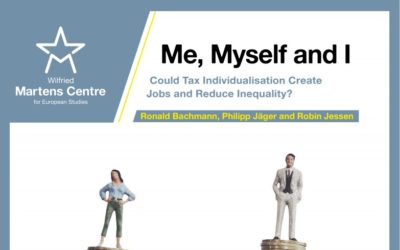 Loading...
Loading...-
Apparently, populism now comes in both good and bad varieties! Taxing the rich or the super rich – nobody knows where to draw the line – is in the camp of the good. And quick wins in public assent are guaranteed. Unfortunately, a sense of moral superiority and simple-mindedness should not replace rational economic thinking. And even from an ethical point of view, these demands don’t stand firm.
In arguing against these revenant proposals, the most recent one by oxfam, we don’t use the usual counterarguments such as capital always finding ways and loopholes of evasion. These technicalities could be largely solved if there is enough political will to take coordinated action among OECD or G20 countries, which remains dubious given the experience of OECD members trying to harmonise and exchange data amongst themselves. More importantly, the question of taxing wealth is a matter of justice and economic efficiency.
Admittedly, global wealth distribution has become even more unequal than income distribution despite remarkable progress in lifting millions out of poverty across the globe. One of the reasons is that, for decades, we have also seen an almost unceasing shrinking of labour income in national GDPs. It is further indisputable that inequality remains a major obstacle to individual and societal development as well as effective governance.
But these observations lead, if carefully analysed, to consequences other than increasing taxation for the super-rich. Firstly, against the popular assumptions, inequality is not, per se, unjustified. Despite centuries of debate, there is no consensus about “just” distribution of wealth and income. Across countries, there is a wide range of inequality that is not immediately considered unjust by the respective societies. How could any global solution of redistribution by taxation work without conflicting with these deeply rooted national traditions and values?
Secondly, even if we concede that extreme inequality is detrimental, the effectiveness of taxing the rich and super-rich as a solution to remedy these deplorable developments is inconclusive. As a means of redistributing primary income, taxation is, in many cases, the least efficient way to counter inequalities and enable sustained improvement of livelihoods. Price signals are far more efficient in indicating scarcity and adjusting individual behaviour. This is even true for common goods, such as those related to environmental protection.
Thirdly, given the need for global taxation of ultra-high value income to avoid tax evasion, we are far from any entitled supranational actor to do so. Even the European Union, with an already impressive set of genuine competencies, is struggling with receiving any substantial revenues of its own. Next to defence, taxation remains the last resort of national sovereignty. Tapping into super-rich assets would have to happen on a national basis. But then, who will decide how to distribute these potential revenues? Are nation-states really willing to go into another round of global redistribution or would they rather darn their budgetary holes? Aren’t we always complaining about overregulation and bureaucracy, only to theorise about creating another complex system?
There are better ways to address inequality and contribute to a socially fairer distribution. But these measures don’t create sexy political messages or quick fixes, and come along with real hard work for lawmakers, without any immediate reward.
First, the well-known inherent shortcomings of the existing taxation systems should be addressed first and foremost, starting from implicit tax increases through inflation to an overdue transaction tax on digital markets. Simplifying tax declarations and reducing excessive tax deductions are also essential to creating a fairer and more transparent system.
Second, the real injustice is not the tax evasion of several thousands of super-rich. The real social scandal is stripping the middle classes of their ability to take care of their own future and degrading them into becoming recipients of redistribution – not quite what a citizens-based, democratic society should be as it undermines social cohesion and poses risks to the future of democratic values.
Third, broadening the taxation basis through sustainable value-creation should be the real long-term objective. Why are we so obsessed with tax evasion, and capital moving abroad? Because we have not been able to create attractive investment options inside our countries, for instance by encouraging innovation and creating a more balanced economic landscape through a more equal distribution of capital. Questions surrounding the equitable distribution of capital income, especially among employees, must be at the forefront of our policy discussions. Simplistic narratives of taxation and redistribution often fail to address these underlying issues, highlighting the need for a more nuanced discourse.
Fourth, why have we failed for decades to distribute capital income more equally and make it a relevant source of income, e.g., among employees? These are relevant questions. Simplistic narratives of taxation and redistribution often fail to address the issues they purport to solve and require a more nuanced discourse.
The call for quick “solutions” like taxing the rich and super-rich is alluring. However, more effective solutions against social inequality have to address the complexities of our taxation systems and the limits of international coordination. We have to aim at empowering the middle class and fostering an environment conducive to sustainable value creation.
Peter Hefele Sonia Chikh M’hamed Economy Taxation

Peter Hefele

Sonia Chikh M’hamed
On Revenants in Economic Policy: Taxing the Rich
Blog
31 Oct 2024
-
Throughout Europe the Covid-19 pandemic has led to lower economic growth and higher unemployment. This has resulted in a surge in public debt and an increase in gender inequalities in the labour markets of many advanced countries. This situation has stimulated interest in policies that can simultaneously boost employment, increase tax revenues and reduce labour market inequalities.
This report investigates whether a move from family-based (i.e. joint) taxation to individual taxation would increase the labour supply of the lower-earning spouse (often the woman). It has often been argued that joint taxation decreases the employment of women because it increases the tax rate for the second earner.
This report focuses on the situation in Germany because work disincentives for women are particularly strong in the country’s tax system. However, it is likely that the conclusions will apply to other EU countries with joint income taxation, for example, France, Poland and Portugal.
According to our simulations, moving to individual taxation would substantially increase the labour supply in Germany and therefore also spur economic growth. Moving to individual taxation and returning the higher tax revenues to married couples (to ensure that there are no additional budgetary costs) would increase the labour supply by more than a half million full-time equivalents. This reform would lead to a measurable increase in GDP, that is, an increase of up to 1.5%.
Such a tax reform might be a way to reduce debt levels and stimulate the economy in the face of the current massive rise in public debt and decline in GDP. It could also help reverse labour market gender inequalities, which have been exacerbated by the pandemic.
However, since the simulated reforms produce results that are not distributed equally, ultimately a political value judgement is needed to decide whether the sizeable efficiency gains would outweigh the losses for those who would lose from the reform. Politically, the negative impact on more financially vulnerable groups may need to be addressed through further targeted tax reforms.
Economy Gender Equality Taxation
Me, Myself and I: Could Tax Individualisation Create Jobs and Reduce Inequality?
Research Papers
06 May 2021


